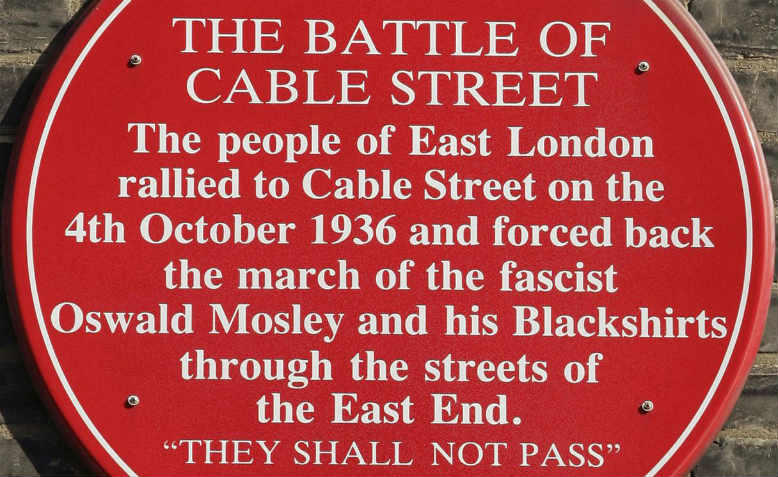 A plaque commemorating the Battle of Cable Street. Photo: Flickr/Spixey
A plaque commemorating the Battle of Cable Street. Photo: Flickr/Spixey
We must keep the spirit of Cable Street alive by confronting organised racism and fighting the effects of the capitalist crisis, argues Feyzi Ismail
The Battle of Cable Street is one of the proudest moments in the history of this country’s working class. It was here that Sir Oswald Moseley’s Blackshirts suffered a decisive defeat, one which marked the beginning of their decline. Up until then their rise had been meteoric, growing to some 50,000 members and having the support of the Daily Mail.
With millions made unemployed by the depression, fascists sought to put the blame on the Jews, following the Nazi party, which had come to power in Germany only three years previously. The Blackshirts planned a provocative march through London’s East End - then an area with a large Jewish population, and then, as now, one of the poorest places in the country.
The Blackshirts were emboldened in part by the police, who not only allowed them to march but attempted to protect them. The anti-fascists put up barricades and women in the houses along Cable Street threw rubbish, rotten vegetables and the contents of chamber pots down at the police and the Blackshirts. After hours of street battles they succeeded, and the Blackshirts had to abandon their march.
The Labour Party opposed the calls to block the fascist march but thousands of party members were among the several hundred thousand people who flooded out onto the streets that day. The people won the Battle of Cable Street, but to win the war against fascism required something more.
What dealt the death blow to fascism in the East End was the building of real struggles of working-class people. The Communist Party’s activists showed in practice that the Blackshirts, who had managed to build a base in the area, in reality had no answers to people’s problems.
Scapegoats
Whenever there is a crisis, the ruling class always needs a scapegoat. Often it’s a group of people who face multiple oppressions and who are the worst off in society, but they are needed by the ruling class as an explanation for why things are so bad. Today, it’s the Muslims.
According to the ideologues, policymakers and followers of the War on Terror, billions must be spent on defence budgets and fighting wars in the Middle East because Muslims and the message of Islam present a threat to the modern world. In the 1930s, it was the Jews, who were across much of Europe amongst the poorest people in society. The roots of racism and fascism lie in the economic and political conditions of crisis, which capitalism inevitably falls into.
Anti-racist and anti-fascist struggles today cannot be separated from wider struggles against the system.
We must keep the spirit of Cable Street alive by confronting the poison of organised racism and fascism, institutional racism and Islamophobia, but also by fighting the effects of capitalist crisis together with those who bear the brunt of it. This is the real meaning of solidarity.

